The Age of Astrea
In Greek mythology, Dicke Astreya is one of the Ors, the goddess of justice, the daughter of zeus and Themis. Dicke reported all the injustices on earth. The time when she was on earth was a happy, "golden age." She left the earth in the Iron Age and since then under the name virgo shines in the constellation of the zodiac. The nickname
of Astray (stellar, heavenly) is probably due to the idea that true justice is possible only in heaven. The expression "Age of Astrea" is used in the meaning: happy time.
Astreia. Goddess of justice.
BarbarianArtist Yuri DubininArtist Rembandt
This expression originated from ancient Greek tradition. When the Persian king Cyrus occupied the city of Prienu in Ionia, the inhabitants left it, taking with them the most valuable of their property. Only Biant, one of the "seven wise men" who was born in Priena, left empty-handed. In response to the perplexed questions of his fellow citizens, he answered, referring to spiritual values: "I carry everything with me." This expression is often used in the Latin formulation belonging to Cicero (Stoic Paradoxes, 1, 1): Omnia mea mecum porto.
more]The barbarian is a contemptuous designation of a rude and uncultured man. It emerged from "barbaros" - "incomprehensible chattering." That's how the Greeks called those who didn't speak Greek.
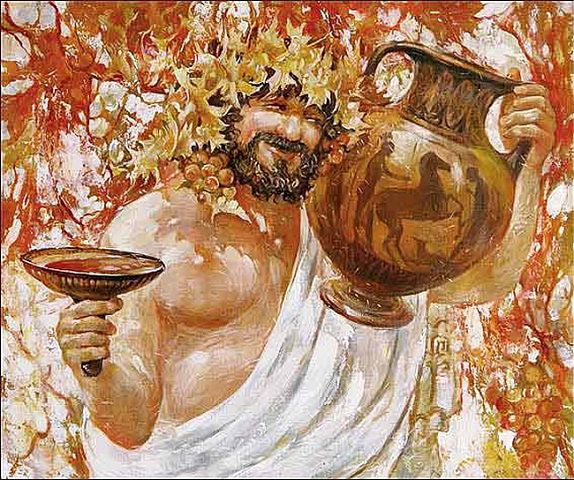
The Libation of Bahusa (Bacchu)
Bacchus (Bacchus) is the Roman name of the Greek god of wine and fun Dionysus. The ancient Romans had a rite of libation for the ancient Romans, which consisted of pouring wine from a bowl in honor of God. Hence the humorous expression "libation of Bahusa" used in the meaning: drinking. The name of this ancient Roman god is used in other humorous expressions about drunkenness: "to worship Bahus," "to serve Bahus."
The Babylonian pandemonium
expression arose from the biblical myth of an attempt to build a tower in Babylon that would reach the sky. When the builders began their work, the angry God "mixed their language", they ceased to understand each other and could not continue the construction (Genesis, 11, 1 - 9). (Turk.-glory: pandemonium is the structure of a pillar, a tower.) Used in meaning: clutter, mess, noise, clutter
Babylonian pandemonium
The Wallaamian Donkey
Expression originated from the biblical legend of Valaam, whose donkey once spoke in human language, protesting against beatings (Numbers, 22, 27-28). It is used ironically in application to silent and submissive people who suddenly spoke, protested.
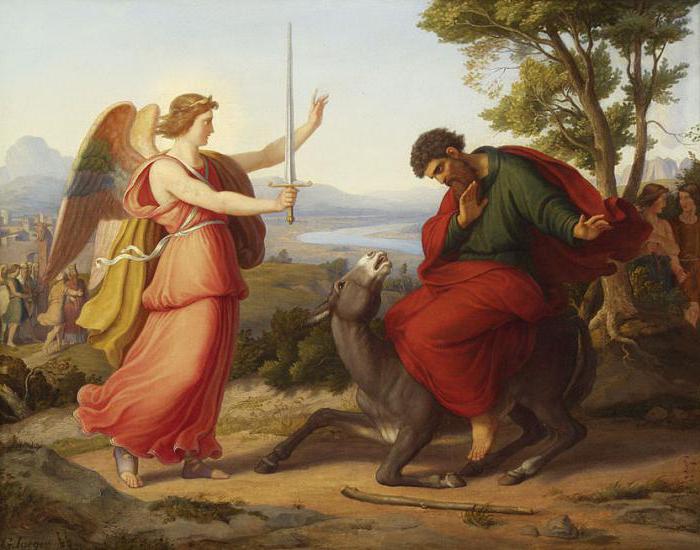
Valaam got up in the morning, saddled his donkey, and went with the princes of Moavita. He rode on his donkey and with them two of his servants. And she saw the donkey Angel of the Lord standing on the road with a naked sword in her hand, and rolled the donkey off the road, and went to the field; and Valaam began to beat the donkey to get her back on the road. And became the Angel of the Lord on a narrow road, between the vineyards, where on one side the wall and on the other side of the wall. The donkey, seeing the Angel of the Lord, clung to the wall and pressed Valaamova's leg against the wall; and he started hitting her again. The angel of the Lord crossed again and stood in a cramped place where there was nowhere to turn, neither to the right nor to the left. The donkey, seeing the Angel of the Lord, lay down under Valaam. And Valaam's wrath erupted, and he began to beat the donkey with a stick. And the Lord of the donkey's mouth was rejected, and she
said to Valaam, "What have I done to you, that you are hitting me for the third time?" Valaam said to the donkey, "For the fact that you had a fight over me; If I had a sword in my hand, I'd kill you now. The Donkey said to Valaam, "Am I not your donkey you used to ride to this day? did I have a habit of doing this to you? He said no. And the Lord opened Valaaam's eyes, and he saw the angel of the Lord standing on the road with a bare sword in his hand, and bowed, and fell on his face. And the angel of the Lord said to him, "Why have you beaten your donkey three times already? I came out to prevent you, because the way is wrong for me; and the donkey, having seen Me, has rolled away from Me three times already; If she hadn't rolled away from Me, I would have killed you, and she would have been left alive. And he said to the Lord's Lady That I had sinned, for I did not know that You were standing against me on the road; So, if it is unpleasant in your eyes, I will return. And the angel of the Lord Valaaam said, "Go with the Simi people,
just say what I will tell you. And Valaam went with the princes Valakov.
The wolf in sheep's clothing
Expression originated from the Gospel: "Beware of the false prophets who come to you in sheep's clothing, and inside the essence of wolves are predatory" (Matthew, 7, 15). It is used as a characteristic of a hypocrite hiding his bad intentions under the mask of virtue.
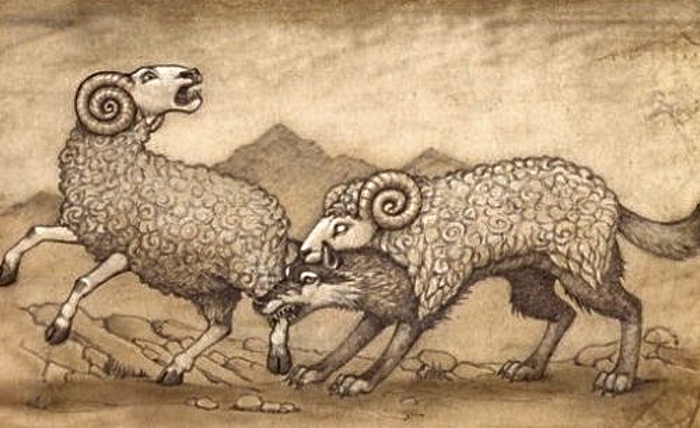
To drink the cup to the bottom
The expression arose from the Bible: "Rise, rise, Jerusalem, you, who from the hand of the lord drank a cup of his fury, drank to the bottom a bowl of intoxication, drained" (Isaiah, 51, 17). It is used in the meaning: to go to something to the end, to transfer all the troubles.
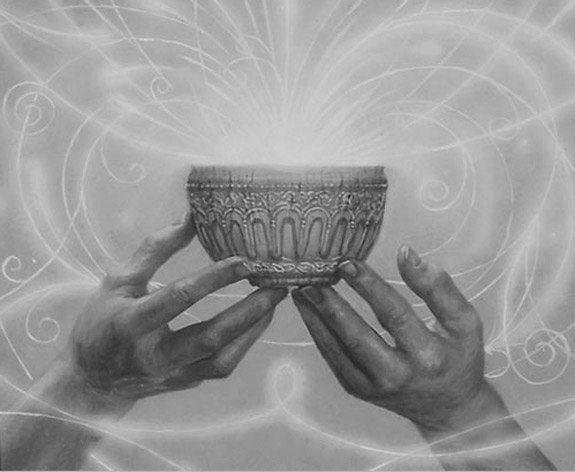
Всё свое ношу с собой
Valtasarov pier. Life of Valtasar.
The expression originated from the Bible (the book of the prophet Daniel, 5) from the story of the feast of the Chaldean king Valtasar (Baltazar), during which the mysterious hand is written to the wall of the letter, foreshadowing his death; on the same night, Valtasar was killed and his kingdom was taken over by Darius Midyanin. Used in the meaning: a fun, frivolous pastime of time of any disaster.
 |
Rembrandt. "Pier Valtasara." The Babylonian king Of Valtasar is described in the Old Testament book of the prophet Daniel. At the crowded feast he ordered to bring gold and silver utensils, which his father Nebuchadnezor took from the sanctuary of the Temple of Jerusalem. The king ordered to fill the vessels with wine for his nobles, wives and concubines. When this blasphemy happened, suddenly a mysterious hand appeared and drew strange words on the wall: "Mene, me, tekel, parsin." Daniel told the king that they meant his death; prediction came true the same night. Rembrandt's painting explores the amazement and fear reinforced by wine that has also spilled out of sacred vessels, which is also symbolic. Surprising in Hebrew inscription, the special arrangement of letters of which makes you remember the neighbor rembrandt Jew Manassa bin Israel, with whom, as you know, the artist maintained a relationship.

Var, Var, give me back my legions.
The Roman historian Svetonius (circa 70-160 AD) in his essay "The Life of the Twelve Caesars" (August, 23) tells that Emperor Augustus, having received the news of the defeat of his commander Vara in the Tevoburg forest, when the selected Roman legions were exterminated by the Germans (9 AD), exclaimed in despair: "The quenchers were in despair." The winged expression became in a different form: Var, Var, return (give) me my legions!
Faith of the mountains moves
the Expression goes back to the evangelical text: "If you have faith with mustard seed and say this mountain: go from here to there - it will pass; and nothing will be impossible for you (Matthew, 18.20; Mark,2,23). The expression is used without religious coloring in meaning: the conviction in the rightness of a case helps to overcome all the difficulties associated with it.
Eternal City
This sustainable name in the world literature of Rome dates back to the 5th elegy of the second book of the elegy of the Roman poet Tibull. (59-19 BC). The poem is essentially a hymn to Apollo, which as the patron saint of Rome foreshadows the extraordinary growth of its greatness. Despite the fact that this expression originally laid down the idea of the political greatness of Rome, it did not become less popular and after the collapse of the Roman Empire and the loss of Rome's former greatness. Nowadays, it is used primarily in the meaning of a huge cultural complex, accommodating antiquity, Christianity and rebirth.
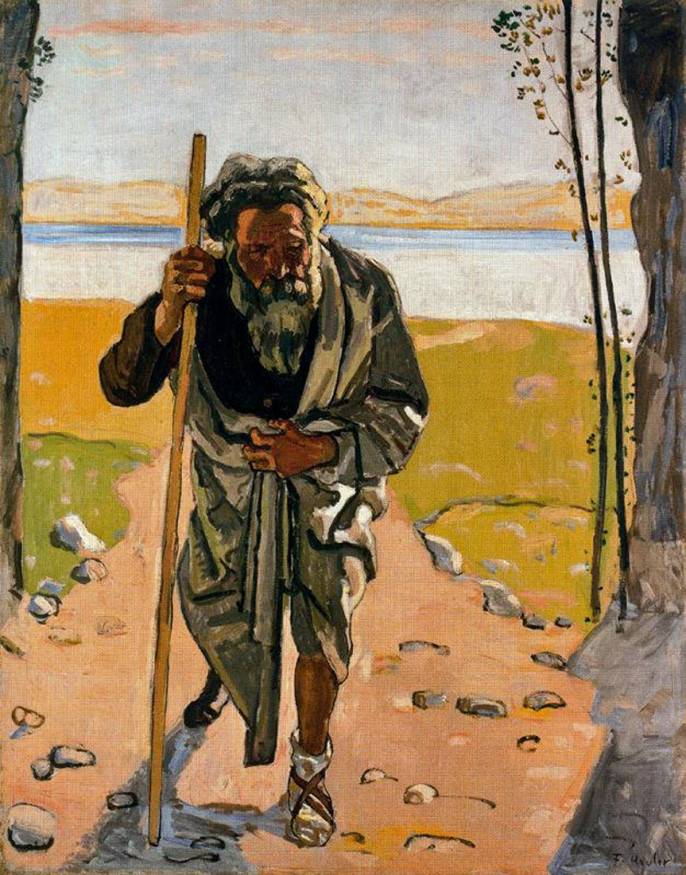 |
The eternal Jew
Expression, denoting the eternal wanderer, arose from the medieval legend of the Agaspher, doomed to eternal wanderings as punishment for refusing to help Jesus carry his cross, with which he went to the crucifixion. The tragic image of Agasfer, the legend of which, according to some scientists is rooted in the era of the Great Migration of Peoples, was widely used in the world literature - Goethe, Schukovsky, Eugene Xiyu and other authors. Put the fingers in the ulcers
of the Expression that originated from the Gospel;
used in meanings: to touch a sore place, exacerbating suffering; check absolutely everything without trusting anyone else.
|
|
Artist Caravaggio
The resurrection of
Lazarus Expression, which arose from the evangelical legend of one of the miracles of Jesus, who supposedly resurrected a certain Lazarus on the fourth day after his death. It is used in meanings: recovery after a long serious illness;
return to something old, forgotten.
